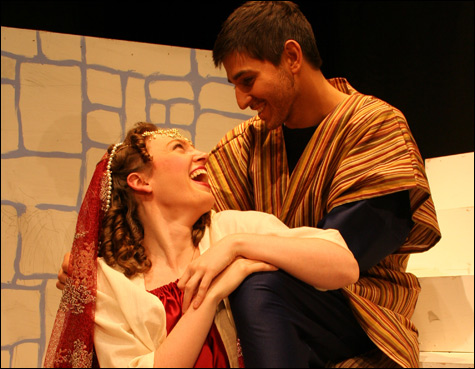
LOVE THAT YIDDISH THEATER Harvard made a brave attempt at Shulamis, or The Daughter of Jerusalem. |
After its triumphant traversal of the complete Béla Bartók string quartets at the Isabella Stewart Gardner Museum, the Borromeo Quartet was back for a free 20th- and 21st-century program at Jordan Hall, leading off with an accomplished recent piece by the 24-year-old Anglo-Arabic composer Mohammed Fairouz, Lamentation and Satire, whose two connected movements expressed those contrasting sentiments and made them seem inextricable. Gunther Schuller, one of Fairouz's mentors, followed: his skittery and tremulous String Quartet No. 4 (2002), almost improvisatory and heartbreakingly eloquent. (The Borromeos are recording all the Schuller quartets.) Then Bartók's big Fourth Quartet, in a performance that — partly because the acoustics in Jordan Hall are so much richer and have so much more depth — seemed even stronger, more detailed, more shapely, more vibrant than the one at the Gardner. These extraordinary musicians live inside the music they play.
Which brings me to the Emerson String Quartet, the admirable ensemble whose Celebrity Series recital last Friday offered a program with a tragic-comic cast that guaranteed a smaller house than an all-Beethoven program would have brought in: Charles Ives's lively, early First Quartet (From the Salvation Army), Leos Janácek's Kreutzer Sonata Quartet (named after Tolstoy's great story), and Dmitri Shostakovich's wrenching Quartet No. 9, plus a bonbon, Samuel Barber's famous 1936 Adagio from his Opus 11 Quartet. The Emersons have a devoted following, and they deserve it. But what is it about these extremely musical players that leaves me wanting more?
The Borromeos always have me on the edge of my chair with their propulsive, suspenseful phrasing. The Emersons seem less engaged. Each phrase has a certain eloquence, yet it all goes by like a slide show, without quite taking you anywhere. When Lawrence Dutton's viola string broke in the middle of the giddy Shostakovich Scherzo, it didn't really matter that the performance had to stop, even though the five movements are supposed to be played without pause. Barber's lyrical outpouring ought to sweep you along — yet after the intense climax, the music went on for a few more bars and then ended. Where was the tenderness? The heartstopping beauty? It was as if the musicians were listening from outside rather than burning from within. Does their policy of playing standing up (except for the cellist, of course) and alternating first violinists from piece to piece add to a certain distancing? There's never anything schlocky or dishonest, no effect merely for the sake of effect. It's just that I always feel there's something missing.
The one encore — a quartet arrangement of a very pretty Dvorák song — had the sweetest playing of the evening.
Hungarian-German conductor Christoph von Dohnányi, who just turned 80, led the BSO's final concert of the season: Bartók's divertingly unsettling Divertimento for String Orchestra (last played by the BSO in 1983), Bohuslav Martinu's Second Violin Concerto (commissioned by the BSO but not programmed since Serge Koussevitzky led Mischa Elman at Tanglewood in 1946), and Antonín Dvorák's more familiar Eighth Symphony (last heard here two years ago — the BSO played the American premiere in 1892, under the legendary Arthur Nikisch).